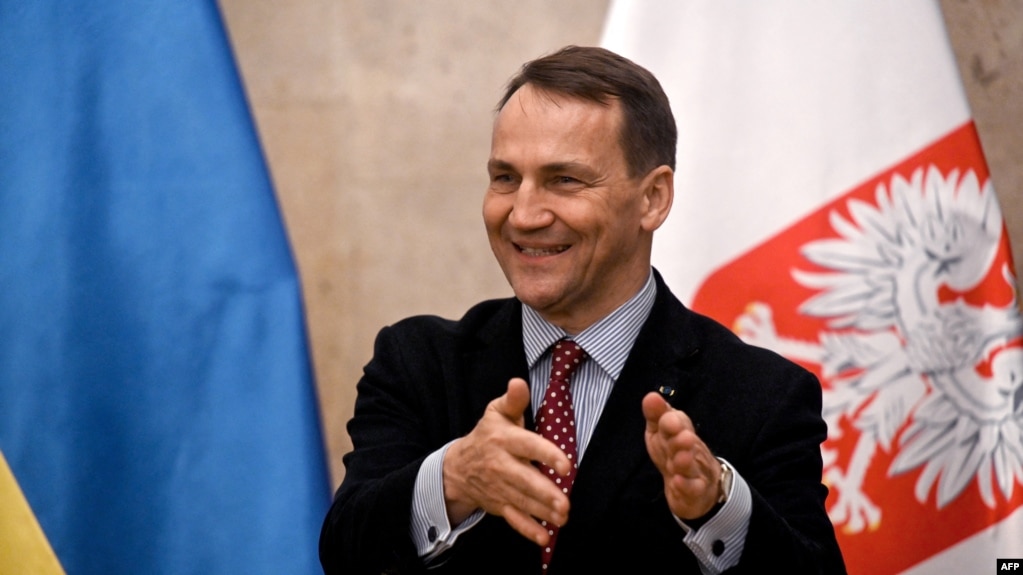
FILE – Polish Foreign Minister Radoslaw Sikorski speaks to reporters during his visit in Kyiv, Dec. 22, 2023.
Europe must be ready to fill the potential gaps in funding and weapons for Ukraine that may arise when U.S. President-elect Donald Trump takes office, Polish Foreign Minister Radosław Sikorski said Friday.
In an exclusive sit-down interview with VOA Eastern European Bureau chief Myroslava Gongadze, Sikorski noted that Trump and fellow Republicans appear reluctant to continue robust U.S. support for Ukraine, and he said it would be crucial to leverage frozen Russian assets to sustain Ukraine\’s defense.
Sikorski also called on EU nations to increase defense spending to meet the challenges posed by Russia’s aggression. Sikorski said solidarity between the EU and the U.S. remains vital to sustaining Ukraine’s fight, deterring further Russian aggression and safeguarding democratic values on the continent.
The interview has been edited for brevity and clarity.
VOA: We start with the latest development, specifically on Russia using ballistic missiles in Ukraine, basically testing ballistic missiles on the civilian population. Do you see this as a new escalation of the war, and what should the West’s response be?
Polish Foreign Minister Radosław Sikorski: There\’s a lot of noise, as you know, as to what exactly hit Ukraine. Russia has been using ballistic missiles throughout this war, but this is alleged to have been an intercontinental ballistic missile — which normally has a different use, which, if it is the case, is on the one hand an escalation and a signal, but on the other hand also an act of desperation that Putin is unable to win in this war, and we see signs of the Russian economy in real stress. We have reports of Russian soldiers deserting. And of course, inviting mercenaries from North Korea is not exactly a sign of strength.
VOA: Still, what would be Poland’s response, and how are you concerned about this latest development? You advocated for extending the air defense over part of Ukraine, western Ukraine. NATO and Brussels didn\’t agree. Do you think it\’s time to reconsider?
Sikorski: Maybe, let\’s be precise about what the stakes are. Poland is a victim of Russian missiles and drones. We assume that they lost control, and we\’ve had several drones, as has Lithuania and Romania, and also cruise missiles. One of them traveled two-thirds of Poland and fell 10 kilometers from my house in western Poland.
There was another incident in which a Russian missile launched at western Ukraine was shot down and the debris killed two Polish citizens, obviously, on our side of the border.
We also had Russian cruise missiles breaching our airspace briefly in order to hit Lviv from the west, and there is no legal or operational doubt that once this stuff is in our airspace, we have the right to shoot it down, but when we do that over our territory, the debris damages something or can kill someone.
So, the debate is about whether the right of self-defense extends only to one\’s own airspace or to the immediate area of a neighboring country, particularly when that neighboring country is asking us to shoot Russian missiles over its territory. And you can have a genuine difference of opinion as to this issue.
I personally think that when the Russians send missiles or drones into another country, the least they can expect is that they\’ll lose the missile or the drone.
VOA: So, would you be lobbying NATO on this idea of extending protection of airspace over Ukraine?
Sikorski: We\’ve had this discussion in the summer, and no decisions were taken by the alliance. And we do want to act as an alliance, because we have an integrated radar system and integrated anti-aircraft system, and we want our allies to be able to react to any further Russian escalations jointly.
VOA: Recently, you opened a new military base near Kaliningrad. This base was planned for a long time. You signed the agreement with Americans a long, long, long time ago. However, now Russia is saying that this base will be a target. How significant is the opening of this base for Poland, and how do you respond to threats from Russia?
Sikorski: Well, here we are in Warsaw. I mean, that was also a target. But the base would be capable of shooting down such Russian missiles as the one that hit Ukraine a couple of days ago because it is Aegis on shore — it\’s essentially an American destroyer built on land, and it could handle all types of missiles, not only ones aimed at the United States but also ones aimed at Europe.
Transatlantic tensions
VOA: Recently, you hosted five ministers of foreign affairs of European countries here in Warsaw, and you talked about boosting defense spending, U.S.-EU collaboration and supporting Ukraine. What are the biggest challenges you see in all those three areas?
Sikorski: Well, we don\’t know what the new administration will do in regards to supporting Ukraine. If they wanted to threaten Putin with escalation, they would have to be ready to pass another package of support for Ukraine in Congress, and so far, we see no willingness to do that. If they don\’t pass another package, then it\’s up to Europe to step in, and it would be expensive. But the war is costing us about half a percent of GDP. We are a 15 trillion-euro economy.
My view is that if we allowed Putin to win, the cost of deterring him then would be much higher. So, it\’s better to help Ukraine, particularly as we have resources and ready finance that only requires political will to take action — namely, the frozen Russian assets, and not only the loan, but the capital itself. So, $45 billion Ukraine is getting already. We could use the remaining $250 billion.
My personal judgment is that by the end of next year, the Russian economy will be really in trouble, and therefore the challenge is to sustain Ukraine for one more year, and we have the money, so that\’s as regards support for Ukraine.
Europe also needs to do more for its own sake, but also, if we are to gain respect in Washington, we need to show Donald Trump that we listened when he was right when he demanded that European countries spend more [on defense]. Poland has done more than its fair share. We are spending 4.7% of our GDP on defense next year, more than double, almost triple, of what some richer countries are doing. But we know the realities in Germany, and constitutional court judgments in Italy and France.
We also have a high budget deficit, but we\’ve had the success of euro bonds secured on the joint credibility of the entire European Union. And it turns out that the European Commission can raise money very cheaply in the financial markets for the COVID recovery plan, hundreds of billions of euros.
VOA: Experts say that Europe needs $720 billion to invest in defense and military modernization in general. Do you feel that European countries are ready to spend, that they understand the needs and are now ready to move ahead with this?
Sikorski: At the Warsaw meeting, we discussed this idea. It didn\’t find its way into the communique, but in our conversations, there seems to be general receptiveness to such a plan.
VOA: President-elect Trump is promising to achieve peace. How do you see your relationship with the U.S. now, with the old administration going and the new administration coming?
Sikorski: Everybody wants peace. If Ukraine capitulated, there would be peace. So, Putin also wants peace. The question is, on what conditions? You know, under communism, we had peace, but it was like the peace of a prison. So, the question is, will the U.N. Charter be respected, and will the security and border guarantees that Ukraine already had, including from Russia, be respected? And the question is how to achieve it.
The war will end, not when Ukraine stops fighting. In that case, there would simply be no Ukraine. The war will end when Putin stops fighting. So, what needs to happen is for Putin to come to the judgment that the war was a mistake and that it cannot be won at an acceptable price.
And I think he\’s actually closer to it than he pretends. He is all braggadocio. In fact, it\’s a catastrophic outcome so far, and he\’s in trouble. He\’s just trying to position himself into hypothetical negotiations. But the United States, Europe and Ukraine have stronger cards than he thinks.
VOA: Were you able, or will you be planning to deliver this understanding to the newly elected U.S. president?
Sikorski: I\’m in touch with his former officials and the people who are being talked of as future officials. Our president has been in touch with Donald Trump all along. He calls him his friend, an American hero. We hope that that personal relationship will also be effective.
VOA: He [Trump] pushed Europe to put more in defense, and Europe may have to stand alone. He said that Europe has to take responsibility for its security.
Sikorski: Given that America cannot handle two conflicts at the same time, and given that successive U.S. presidents have told us frankly that for them, their competition with China is the number one issue, we should take greater responsibility for our security.
VOA: And Europe is ready?
Sikorski: Europe is always a little tardy, because we are democracies, because you always have to make choices between guns and butter, and our societies prefer butter. But I think the scale of Russian atrocities, the pictures of civilian targets being hit, the threat of what Putin is trying to cause, which is another wave of millions of refugees — this should be a wake-up call to all Europeans.
By:VOA


